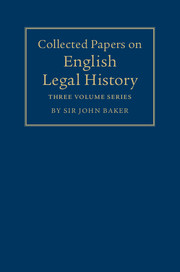Book contents
- Collected Papers on English Legal History: Volume I
- Contents
- List of Illustrations
- Acknowledments
- List of Abbreviations
- Introduction
- PART I The Legal Profession
- PART II The Inns of Court and Chancery
- PART III Legal Education
- PART IV Courts and Jurisdictions
- Collected Papers on English Legal History: Volume II
- Contents
- PART V Legal Literature
- 29 The Three Languages of the Common Law
- 30 Case-Law in Medieval England
- 31 Dr Thomas Fastolf and the History of Law Reporting
- 32 John Bryt's Reports and the Year Books of Henry IV
- 33 Case-Law in England and Continental Europe
- 34 The Books of the Common Law 1400–1557
- 35 English Law Books and Legal Publishing 1557–1695
- 36 Books of Entries
- 37 Manuscripts in the Inner Temple
- 38 Common Lawyers' Libraries 1450–1650
- 39 John Rastell and the Terms of the Law
- 40 Coke's Notebooks and the Sources of his Reports
- 41 John Selden and English Legal History
- 42 The Newe Littleton
- 43 Sir Thomas Robinson's Notebooks
- PART VI Legal Antiquities
- PART VII Public Law and Individual Status
- PART VIII Criminal Justice
- Collected Papers on English Legal History: Volume III
- Contents
- PART IX Private Law
- PART X General
- Bibliography of the Published Works of Sir John Baker
- Index
40 - Coke's Notebooks and the Sources of his Reports
from PART V - Legal Literature
Published online by Cambridge University Press: 05 December 2014
- Collected Papers on English Legal History: Volume I
- Contents
- List of Illustrations
- Acknowledments
- List of Abbreviations
- Introduction
- PART I The Legal Profession
- PART II The Inns of Court and Chancery
- PART III Legal Education
- PART IV Courts and Jurisdictions
- Collected Papers on English Legal History: Volume II
- Contents
- PART V Legal Literature
- 29 The Three Languages of the Common Law
- 30 Case-Law in Medieval England
- 31 Dr Thomas Fastolf and the History of Law Reporting
- 32 John Bryt's Reports and the Year Books of Henry IV
- 33 Case-Law in England and Continental Europe
- 34 The Books of the Common Law 1400–1557
- 35 English Law Books and Legal Publishing 1557–1695
- 36 Books of Entries
- 37 Manuscripts in the Inner Temple
- 38 Common Lawyers' Libraries 1450–1650
- 39 John Rastell and the Terms of the Law
- 40 Coke's Notebooks and the Sources of his Reports
- 41 John Selden and English Legal History
- 42 The Newe Littleton
- 43 Sir Thomas Robinson's Notebooks
- PART VI Legal Antiquities
- PART VII Public Law and Individual Status
- PART VIII Criminal Justice
- Collected Papers on English Legal History: Volume III
- Contents
- PART IX Private Law
- PART X General
- Bibliography of the Published Works of Sir John Baker
- Index
Summary
Four hundred years ago this April, Edward Coke of Trinity College, Cambridge, was admitted to the Inner Temple, an event momentous not merely in the history of the inn but also in the history of the common law. For it was in 1572 that young Coke began to attend the courts and to observe the decisions there, to listen to Bendlowes and Plowden and Dyer as they opened for him the secrets of jurisprudence. He was to continue his attendance at Westminster Hall for forty-four years, and from 1579 to record all the important cases which came to his notice. It is, therefore, an auspicious moment to remember Coke's achievement as a reporter of cases, a matter of particular interest in ‘that famous University of Cambridge, alma mea mater’, to whose legal offspring Coke's literary works were especially addressed.
It is unnecessary to sing the praises of Coke's Reports as sources of law and history. For all their quaint defects they ‘will last to be admired by the judicious posterity whilst fame hath a trumpet left her, and any breath to blow therein’. In view of their undiminished importance, the almost complete absence of original textual studies is somewhat remarkable. In the latest edition of the Reports, published as long ago as 1826, Mr J. H. Thomas attempted to sever the personal comment and digression from the actual resolutions of the courts; but his only guide was his own instinct, corroborated where possible from other contemporary reports.
- Type
- Chapter
- Information
- Collected Papers on English Legal History , pp. 732 - 764Publisher: Cambridge University PressPrint publication year: 2013



